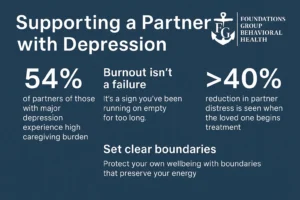When your partner is struggling, everything in you might want to carry them. Be the calm one. The patient one. The fixer. But over time, that kind of love can turn into exhaustion. Guilt. Even resentment.
Here’s the truth: supporting someone with depression doesn’t mean losing yourself. Boundaries aren’t abandonment. They’re what allow you to stay in the picture without burning out.
At Foundations Group Behavioral Health, we work with partners and spouses across Cape Cod who are walking this road every day. If you’re in love with someone who’s hurting, here’s what real, healthy support can look like.
Boundaries Aren’t Cold—They’re the Only Way to Stay Connected
It’s easy to confuse boundaries with emotional distance. But the truth is, boundaries are what let love survive under strain.
Without them, you may feel like you’re constantly absorbing the mood of the household, rearranging your life around your partner’s lowest moments, and slowly disappearing in the process.
Boundaries might look like:
- Protecting one night a week for your own plans or rest
- Agreeing on safe topics during high-stress moments
- Saying, “I care, and I also need to step away right now”
These aren’t ultimatums—they’re anchors. They remind both of you that the relationship includes two people with needs.
Burnout Isn’t a Sign You’re Giving Up—It’s a Sign You’ve Been Giving Everything
You’ve likely been operating in crisis mode for longer than you realize. Checking in constantly. Bracing for silence or outbursts. Canceling your own plans just in case something goes wrong. That’s not love—that’s survival.
Burnout can show up in subtle ways:
- You start avoiding home, even if you’re not sure why
- You feel resentment after even small requests
- You forget what it feels like to not be on alert
It’s not selfish to feel depleted. It means you’ve been pouring from a cup that hasn’t been refilled in a long time. That’s not failure. That’s a flashing red light—time to pull over, not push harder.
Support Doesn’t Mean Saving—And Love Doesn’t Mean Fixing
When someone you love is hurting, it’s tempting to think: “If I just say the right thing, they’ll feel better.” Or, “If I don’t stay close, they might slip even further.” But emotional caretaking isn’t a sustainable plan for healing.
Here’s what healthy support might actually sound like:
- “I’m here. I can’t fix it, but I’ll stay beside you while you get help.”
- “I love you. And I also need support too—I can’t do this alone.”
- “You matter to me. And so does my health.”
None of those statements are cruel. In fact, they’re generous. They make room for real care—care that doesn’t collapse under pressure.
When Depression Treatment Enters the Picture, Everything Shifts
If your partner starts depression treatment in Cape Cod, MA, you’re not alone anymore.
Treatment introduces structure. Accountability. A space that isn’t you where they can speak freely, cry safely, and work through what’s going on. That frees up space in your relationship for other things—connection, rest, and maybe even joy.
We often hear from loved ones:
“I didn’t realize how much I’d been carrying until they started therapy. I finally felt like I could exhale.”
Treatment doesn’t erase the challenge. But it distributes the weight—and that alone can be life-changing.
Your Mental Health Matters, Too
In this dynamic, it’s easy to disappear. Especially if your partner’s depression makes them withdrawn, irritable, or emotionally unavailable. Over time, you might start asking yourself:
- “Is it selfish to need more?”
- “Should I just wait until they’re better?”
- “What if taking care of myself makes them feel abandoned?”
These are normal questions. But the answer is consistent: your needs are valid. Always.
Protecting your own mental health might look like:
- Going to therapy, even if your partner won’t
- Journaling or talking with friends without filtering everything
- Joining a support group for partners and spouses
If you’re located in Falmouth or Barnstable County, we can help you find local options that support not just your partner, but you.
How to Talk About Treatment Without Causing a Blowup
If your partner isn’t in treatment yet—or is resistant—you might be walking on eggshells. You want to bring it up, but fear a shutdown. That’s real. Here’s how to try gently:
- Choose a calm moment. Don’t bring it up mid-argument.
- Use “I” statements: “I feel worried and unsure how to help,” rather than “You need help.”
- Ask permission: “Would it be okay if I shared something that’s been on my mind?”
Remember, you’re not demanding. You’re inviting. And if they’re not ready, you can still move forward. Reaching out on your own can clarify your next steps—even if they haven’t taken theirs.
Support for Both of You Is Possible—Even if You’re at Different Stages
One of the hardest parts of loving someone through depression is the imbalance. You might be in problem-solving mode. They might be numb or stuck. And you might wonder: Can we even make it through this?
The answer isn’t simple. But it starts with remembering:
- Their healing is theirs to own
- Your wellbeing is your responsibility, too
- The relationship deserves care from both sides—not just emergency triage from you
And if you’re both willing to take small steps—toward treatment, communication, boundaries—it is possible to rebuild something solid.
FAQs: Depression Treatment & Supporting a Partner
How do I know if my partner’s behavior is depression—not just disinterest?
Depression often causes emotional withdrawal, lack of motivation, and flatness—not because the person doesn’t care, but because they’re overwhelmed by numbness. If you’re seeing changes in sleep, mood, appetite, or hope, treatment may help clarify the cause.
What if they refuse treatment?
You can’t force someone to change. But you can set boundaries, seek support for yourself, and make space for the idea of help. Sometimes, knowing a loved one is getting support themselves is what softens resistance.
Should I go to therapy even if they won’t?
Yes. Individual therapy can help you process emotions, reduce resentment, and get grounded in your own truth. You don’t have to wait for your partner to go first.
What does depression treatment actually involve?
Treatment may include talk therapy (like CBT or interpersonal therapy), medication evaluation, and structured support programs. At Foundations, we tailor treatment to each person’s needs—not a one-size-fits-all model.
Is it okay to take space in the relationship while they’re in treatment?
Yes. Sometimes loving someone well means creating space to heal individually. You can love someone and still protect your own peace. Taking space isn’t quitting—it’s breathing.
You Can Love Them and Still Need Support
You’re not failing for feeling overwhelmed. You’re not a bad partner for needing care too. And you’re not alone.
Whether your loved one is in treatment, avoiding it, or somewhere in between, you deserve information, clarity, and real support. If you’re looking for depression treatment in Cape Cod, we’re here—for both of you.
Ready to talk?
Call 888-685-9730 or visit our Depression Treatment services in Cape Cod, MA to learn more. Your love matters—but so does your wellbeing.









